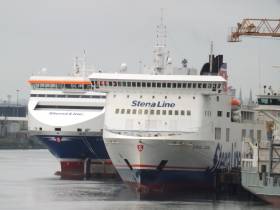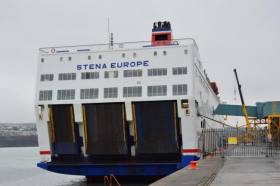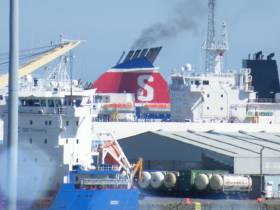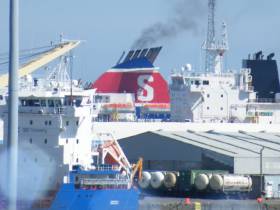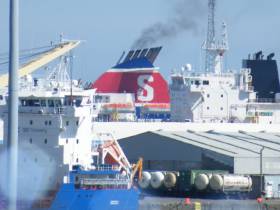Displaying items by tag: Stena Line
New RoPax Vessels for Stena Line Beginning to take Shape
#FerryNews - An official keel-laying ceremony of a new RoPax for Stena Line took place at the AVIC Weihai Shipyard in China last Friday.
The traditional maritime event marks the start of the construction phase of the hull and the exterior parts of the vessel.
As previously reported on Afloat, the new RoPax vessels will be deployed on the Irish Sea and represent a key strategic investment to continue to further strengthen Stena Line’s business in the region.
“This is an important milestone in our exciting new ship building project”, said Niclas Mårtensson, CEO Stena Line, who also took part in the traditional Coin Ceremony where 4 coins (GBP, EUR, SEK and RMB) where placed under the keel-block as a symbol of good fortune.
The new vessels have a planned delivery timetable during 2019 and 2020. They will be 50% bigger than today’s standard RoPax vessels and this significant investment illustrates a continuation of Stena Line’s successful RoPax concept which mixes freight and passenger traffic as part of its operational business model.
“Our overall target is that these vessels will be the absolute state-of-the-art when it comes to energy efficiency, flexibility and customer service. In particular, we are placing heavy emphasis on developing a range of exciting new digital features which will provide our customers with unique additional services connected with their journey as well as developing a new, integrated digital onboard experience”, said Niclas Mårtensson.
“We have a positive outlook on the future and foresee continued growth within ferry transportation so this is an important strategic step in helping us to prepare our business to leverage that anticipated growth”, concluded Niclas Mårtensson.
Technical details of the new vessels:
Length: 214.5 m
Draught: 6.4 m
Breadth: 27.8 m
Car deck capacity: 3,100 lane meter + 120 cars
Passenger capacity: 1,000
Cabins: 175
Engines: 2 x V12 4-stroke diesel (2 x 12,600 kW)
Speed: 22 knots
Built: AVIC Weihai Shipyard, China
Services on Stena's Belfast Routes Deliver Record Trade in 2017
#FerryNews- Services on Stena Line's Belfast-Scotland and England routes in 2017 marked another record trading year for freight and passenger operations.
Freight volumes on its Belfast to Cairnryan, Liverpool and Heysham routes exceeded a record 514 000 units, which represents a 3% year on year increase.
Car volumes topped 360 000, a 2.5% year on year increase with over 1.5m passengers accounting for a similar 2.5% annual increase. Coach traffic delivered the biggest increase at 10.5% underscoring Belfast’s ongoing tourist boom.
Belfast services have been growing significantly over the last five years with a 15% growth in car volumes, a 13% rise in passenger numbers and a 19% increase in freight traffic. A programme of ongoing investment in its ports and ships has been a key factor in this success and today Belfast represents Stena Line’s largest operational hub with seven ships providing up to 22 daily crossing options.
Paul Grant, Stena Line’s Trade Director (Irish Sea North) said: “Whilst Stena Line has delivered a record performance in 2017, we will continue to focus on providing even higher levels of customer service in 2018 which is why we will be investing a further £500k in the upgrade of our onboard passenger facilities this spring.
Paul Grant added: “Consistent year on year growth of our Belfast-based services also positions us at the forefront of Stena Line’s future European investment plans which is why the Irish Sea has been able to attract a number of new build ships to be deployed in the region in 2019/20. While we continue to invest we will also lobby hard for road improvement upgrades, especially the dualling of the A75 in Scotland, to help improve overall journey times for the key Northern Ireland road haulage and tourism sectors.”
The ferry operator is Belfast Harbour’s largest logistics customer and a key contributor to its success in recent years. Joe O’Neil, CEO Belfast Harbour commented: “Belfast Harbour’s on-going success is supported by another record year for Stena Line. We have been partners for more than 20 years and have seen their business here grow significantly during that time. 2017 is no different with increases in passengers, freight, cars and coaches. This is down to their vision and hard work as well as adapting to the market and we look forward to continuing to support them and the growth of their business in the coming years.”
In addition to the Belfast services, Stena Line operate Dublin to Holyhead, Rosslare to Fishguard routes and a direct continental service on the Ireland-France link between Rosslare and Cherbourg
Withdrawal by Stena from Conygar Fishguard Marina Development
#CoastalNotes- A multi-million pound marina development planned for Fishguard Harbour, south Wales have fallen through.
This morning (Thursday) reports the Western Telegraph, the Conygar Investment Company released a statement to the London Stock Exchange, writing off their £2m investment in the Fishguard / Goodwick Marina Development.
Conygar said: "Conygar has been informed by Stena that they do not wish to have any further involvement in the proposed marina development and do not wish to proceed with the reclamation works of the harbour.
"Stena state that they are concerned that the marina development will interfere with the operation of the harbour and their ferry operations. They will also not support the promotion of the Harbour Revision Order, which is necessary to progress the development.
For much more on the decision by the ferry operator, click here.
Road Access at Scottish Port Disadvantages NI Economy
#Ferry - Across Northern Ireland businesses continue to be disadvantaged by poor road access to their key markets in the UK.
Ferry operator Stena Line has raised concerns with local political and business stakeholders to increase the focus and necessity of addressing a critical infrastructure deficit which impacts a range of key NI business sectors including manufacturing, food production and tourism.
Whilst road connections in Northern Ireland have been better at keeping pace with economic development, a situation which will be greatly enhanced once work starts on the York Street Interchange project. The same cannot be said of key roads in Scotland, specifically the road network to and from Loch Ryan Port (Cairnryan), which handles approximately 45% of NI trade (through Belfast Port) with the rest of the UK.
Paul Grant, Stena Line’s Trade Director (Irish Sea North) said: “We have been working hard over a number of years to try to get key road improvements made on the A77 and more importantly the A75 heading south from Scotland. Despite significant investments by ferry operators between NI and Scotland, including Stena Line’s new £80m port and terminal facility at Cairnryan, which included the introduction of two larger ferries, successive administrations have been unable to commit the necessary capital resources to carry out these vital road upgrades.
“Access to and from Scottish ports is severely lacking compared with other UK hubs. Journeys could be made easier and travel times shortened which would help to reduce NI’s remoteness and help support key economic contributor groups such as hauliers and tourists. Investments have been made to roads at Holyhead and Heysham and these are already providing tangible benefits to business and tourism levels in their regions.”
Paul Grant added: “Local politicians need to engage with other stakeholders to get the Scottish and Westminster governments to work collaboratively to push for a fit for purpose road network system on both sides of the Irish Sea. The dualling of the A75 will be a long-term infrastructure project which could take a number of years to plan and complete. As it stands however, the clock isn’t even ticking so if we want NI to remain a competitive, forward thinking economy which can attract major investments in the future, we need to start the process of change and work collaboratively now to get the commitments and resources in place before a shift in trade away from NI becomes irreversible.”
#FerryNews - Animal welfare groups internationally have slammed the “disgraceful” calls from the Irish Farmers’ Association (IFA) to increase the live export of Irish livestock in 2018.
As the Green News.ie writes, the comments come in response to calls from the IFA’s National Livestock Chairman, Angus Woods at a Bord Bia seminar on live exports in Tullamore, Co Offaly yesterday.
Mr Woods said that the Minister of Agriculture, Michael Creed must “put all the necessary resources in place” to facilitate an increase in exports.
The IFA also met with senior officials from the Department of Agriculture to discuss transport options for the export of livestock.
Stena Line is due to refit their existing vessel (as reported previously on Afloat) which is used to transport live exports and the IFA want to ensure that a replacement ship is available for peak export weeks in February and March.
“It must be of the highest priority to Minister Creed that the new arrangements can deal with our live exports and shipping requirements during this peak export period. Market access is absolutely critical,” Mr Woods said.
To read much more including what are claimed as 'horrendous journeys' according to Campaigns at Compassion in World Farming, click here.
Exports of Live Cattle Set to Surge as Ship Awaits the Green Light
#FerryNews - An alternative livestock export vessel is to replace a Stena Line ferry and is due to be inspected by officials this week.
According to the Independent.ie, the announcement will calm farmer fears that the Stena Horizon's temporary removal would seriously hit vital calf export trade this spring.
Concerns had been raised over the transport of calves in the coming weeks with a large volume from the expanding dairy herd destined for export to Europe.
It comes amid a 'flying' start to the season at the first calf sale of the year at Bandon Co-Op Mart yesterday.
Manager Tom McCarthy described a "very good trade" with farmers and shippers "out of the blocks and raring to go".
Live cattle exports soared 35pc last year to over 196,000 head, while meat exports from the processors hit record levels in 2017 despite uncertainty over Brexit and currency issues.
To read further on this story, click here.
Afloat adds that while the passenger ferry Stena Horizon is temporary away on refit according to the Stena Line website there will be no sailings on the Rosslare-Cherbourg route 20th February – 19th March inclusive.
The last sailing from Rosslare to Cherbourg before refit will be at 16.30 on 17th February.
The first sailing from Rosslare to Cherbourg after refit will be at 21.30 on 20th March.
In addition for the latest 48 hour sailing information updates on the Ireland-France route click HERE.
#FerryFestive - An Irish Ferries cruiseferry on the French route based out of Rosslare returned yesterday prior to making a repositioning voyage to Dublin Port this morning in preparation of the busy festive season, writes Jehan Ashmore.
Cruiseferry, Oscar Wilde had completed a Cherbourg-Rosslare crossing. This was followed by the 1,400 passenger/700 car ferry transferring to the Irish capital to begin sailings on the core Irish Sea central coridoor route to Holyhead.
Sailings by Oscar Wilde on the French route have been suspended so to enable firstly the above mentioned capacity increased on the premier UK-Ireland route. In addition the absence of the ferry is to permit annual winter dry-docking of the 1987 built cruiseferry that is scheduled to return to the French service in February 2018.
As of late this morning Oscar Wilde made a first crossing to Holyhead and is due to return to Dublin this afternoon. Also running services to cope with the inward bound influx of seasonal passengers on the Wales-Ireland link are flagship cruiseferry Ulysses, fast-craft Jonathan Swift and ropax ferry Epsilon.
The chartered-in Epsilon, will operate Ireland-France sailings during the absence of Oscar Wilde from Wexford based sailings in 2017, but take heed of the following next scheduled sailings and ports used in both directions.
Afloat can confirm the next outward sailing to the continent is Dublin-Cherbourg and will be after Christmas, on Wednesday 27th December. The next inbound sailing to Ireland will however call instead to Rosslare, arriving on Friday 29th December. For further subsequent sailings details consult Irish Ferries through this link.
Rivals, Stena Line are expected to transport 65,000 passengers over the festive period also on their service between Holyhead-Dublin and on the St. Georges Channel link of Fishguard to Rosslare.
Information on Irish Sea routes, sailing dates, crossing times and more click here for Irish Ferries and for those travelling with Stena Line click here. From this webpage there are also links to their Cherbourg-Rosslare service.
For those travelling on P&O Ferries click this link, noting the weatherline applies to both routes: Liverpool-Dublin and Cairnryan-Larne.
In addition should there be any ferry travel delays, disruptions and cancellations, they are included on the AA’s Roadwatch newsroom here.
Stevedore Doyle Shipping and Stena On Course to Meet in Court Again
#Dispute - A Dublin Port stevedore, Doyle Shipping, whose case against Stena Line was back in court recently, where a ruling on costs was reserved.
Earlier this month as The Irish Times reported, Doyle won an injunction allowing it to continue to provide services to Stena Line ferries docking in Dublin Port. Stena told Doyle last August that it was terminating a contract, worth €4 million annually to the Irish company, to provide services to the ferry company in Dublin.
However, Doyle maintains that this is in breach of a verbal agreement negotiated between the pair for the provision of those services until 2022. So the High Court ordered that Doyle continue to do the work until the case itself is tried. That will happen next year, and Stena is contesting Doyle’s claim on several grounds.
For more, The Irish Times continues with the story here.
Injunction Secured by Doyle Shipping Against Stena Line
#dispute - An injunction has been secured by Doyle Shipping Group allowing it continue to provide services to Stena Line’s ferries docking at Dublin Port.
According to The Irish Times, the order applies until the full hearing of proceedings over the purported termination of the contractual relationship between the companies.
DSG had operated a contract, worth some €4m annually, with Stena Line Limited to provide services to allow Stena’s ferries dock at Dublin port for more than 20 years.
The services include stevedoring, checking-in and out of passengers, loading and unloading freight and administration services.
The contract was renewed periodically but, on August 31st last, Stena informed DSG it was ending the agreement and gave DSG three months notice.
DSG, which provides services at all of Ireland’s major ports, claims the termination notice is in breach of an oral agreement negotiated with Stena in 2015 for provision of services at Dublin Port until 2022.
For more on the story click here.
#dispute - A dispute between ferry operator Stena Line and Doyle Shipping Group writes The Irish Times over the provision of services for docking at Dublin Port has come before the Commercial Court.
Doyle Shipping Group (DSG) had operated a contract with Stena Line Limited to provide services to allow Stena’s ferries dock at Dublin Port.The services include stevedoring, checking-in and out of passengers, loading and unloading freight and administration services.
The contract for providing the services was worth €4 million annually and was renewed periodically. On August 31st last, Stena informed DSG it was ending the agreement and gave DSG three months notice.
DSG, which provides services at all of Ireland’s major ports, argues the termination notice is in breach of an oral agreement negotiated with Stena in 2015 for provision of services at Dublin Port until 2022.
In its proceedings against Stena, DSG wants declarations including the termination notice is invalid and of no effect, and that the 2015 agreement is binding. It also wants injunctions restraining Stena breaching the contract with DSG or transferring any of DSG’s contractual obligations to any other party.
More on the story can be read here.


























